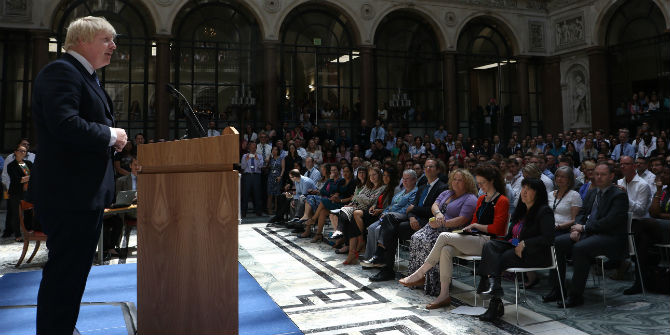 Brexit presents the UK civil service with its greatest challenge since the end of the second world war. It must start preparations for withdrawal from the EU whilst simultaneously undergoing a major restructuring. The creation of new ministries, especially the Department for Exiting the European Union, is intended to better equip it to deliver on the promise that ‘Brexit means Brexit’ by enabling clear political leadership and control, as well as policy clarity. Nonetheless, such change entails significant risks in terms of strategy, process and resource allocation and management. If a ‘good Brexit’ is to be achieved, Nick Wright argues these challenges must be addressed before the UK triggers Article 50.
Brexit presents the UK civil service with its greatest challenge since the end of the second world war. It must start preparations for withdrawal from the EU whilst simultaneously undergoing a major restructuring. The creation of new ministries, especially the Department for Exiting the European Union, is intended to better equip it to deliver on the promise that ‘Brexit means Brexit’ by enabling clear political leadership and control, as well as policy clarity. Nonetheless, such change entails significant risks in terms of strategy, process and resource allocation and management. If a ‘good Brexit’ is to be achieved, Nick Wright argues these challenges must be addressed before the UK triggers Article 50.
Negotiating Britain’s withdrawal from and new relationship with the EU, along with the range of alternative trade agreements promised in the wake of the Leave vote, means the civil service faces its greatest political, logistical, constitutional and legal challenge in decades.

Arguably not since the post-war reconstruction of Britain and the establishment of the welfare state has Whitehall been presented with such an all-encompassing and transformative task. Virtually no department will be untouched and the forthcoming negotiations will also have a significant implications for Scotland, Wales and Northern Ireland.
At the same time, and in order to facilitate effective political control and leadership over Brexit, Whitehall is also undergoing its most significant restructuring in years. A ministry for International Trade has been (re)established, while a brand new Department for Exiting the European Union is being created. Meanwhile, a resource-pressed Foreign and Commonwealth Office must determine how it will feed into a process that is already placing major demands on its expertise and diplomatic network, whilst simultaneously managing Britain’s wider and ongoing foreign policy.
Brexit will undoubtedly alter the character of Britain as a state. In the short term at least, it will also see the remodelling of the apparatus of the British ‘state’, particularly its externally facing components. In a success is to be made of the Brexit negotiations, managing these processes will require leadership, intellectual dexterity and determination at all levels, as well as the provision of significant resources of finance and human capital.
Theresa May has charged a triumvirate of high profile pro-withdrawal politicians with the task of enacting the referendum result: Boris Johnson as Foreign Secretary, David Davis as the new Secretary of State for Exiting the European Union, and Liam Fox as Secretary of State for International Trade.
That none of them lacks self-belief is clear. Less so is how successfully they will be able to co-ordinate and manage their overlapping briefs, a challenge the Commons Foreign Affairs Committee has highlighted. The first test of this will be in how the restructuring of Whitehall is handled.
Not surprisingly, much attention has been focused on Davis’ new ‘Ministry for Brexit’. This will have the bulk of responsibility for and control over both the detailed content of the negotiations and the strategy for pursuing them. Fox’s International Trade Department will focus on reaching trade agreements to fill whatever ‘trade void’ results from Brexit. Meanwhile, the FCO will be expected to fulfil its more traditional role of providing the expert knowledge, diplomatic network and treaty drafting skills to underpin and ‘sell’ the new settlement to partners old and new. On an organisational basis, the Brexit ‘centre of gravity’ will therefore be Davis’ department.
In building his new ministry, Davis has inherited only an embryonic structure. The previous government has been strongly criticised in some quarters for its lack of Brexit contingency planning. In the days following the referendum, David Cameron did appoint Oliver Letwin as Minister for Brexit in the Cabinet Office. Although he enjoyed only the briefest of tenures, Letwin started to construct a cross-Whitehall group of officials from the FCO, BIS, the Treasury and the Cabinet Office. Headed by the well-regarded Oliver Robbins, formerly one of the Home Office’s two permanent secretaries, they were instructed to begin planning for Brexit and develop policy options for the new government.
Their work will be significantly expanded under the new ministry, and with much clearer political direction from the top. Moreover, Davis will expect to augment his team by drawing on expertise from across Whitehall. Melanie Dawes, the Permanent Secretary of the Department for Communities and Local Government, declared recently that all departments should be prepared to release some of their top officials to join this effort.
But Whitehall does not have a limitless supply of officials with relevant expertise. In particular, it lacks trade negotiators, with some estimates putting the number immediately available at around 20, while the expectation is that hundreds more will be needed. As I have written previously, a priority must therefore be the effective allocation and management of scarce resources, particularly of knowledge and expertise, to ensure that government efforts to deliver Brexit do not come at the cost of all the other day-to-day demands placed on it.
A second priority is to ensure that the reorganisation does not result in bureaucratic incoherence or ‘turf wars’. Thus, while the allocation of three lines of ministerial responsibility, and particularly the creation of a ‘Ministry for Brexit’, may satisfy a political logic, the Institute for Government has warned of the risk of ‘serious operational drawbacks’ – particularly in terms of the time, costs and attention required to do this – that may result. Avoiding these will be a key leadership task for Davis and his senior team.
Where does this leave the FCO?
On the face of it, the main casualty of the re-tasking of Whitehall for Brexit seems to be the FCO. Having already faced years of budgetary tightening, it now faces a potential ‘brain drain’ of senior officials, particularly from its European Directorate and UKREP, to Davis and Fox’s new departments. The risk, then, is that in the haste to build up these two additional departments the FCO suffers a form of ‘bureaucratic emasculation’ precisely when its skills and resources are needed most, particularly in maintaining bilateral relationships with key partners in Europe and globally.
As the Foreign Affairs Committee has noted, achieving Brexit ‘cannot come at the expense of an already-overstretched FCO’. The government – and particularly the Treasury – will therefore need to allocate sufficient additional financial resources to ensure that managing Brexit – which is, by definition, a relatively time-limited process – does not weaken the capacity of the FCO to perform its essential function as the central organ of British foreign policy-making and diplomacy over the longer-term. The reality is that Britain’s shortage of experts cannot be filled simply by moving officials from one department to another like chess pieces. If a ‘good Brexit’ is to be achieved, it cannot be done on the cheap.
Will Whitehall be ready?
At her first meeting as Prime Minister with German Chancellor Merkel, Theresa May made clear that Britain needed time to prepare for the commencement of withdrawal negotiations and therefore would not be triggering Article 50 in 2016. By all accounts, Mrs Merkel was sympathetic to this, although warned that things could not be left ‘up in the air’. French President Hollande made similar noises.
While only the UK can decide when it invokes Article 50, the reality is that time is not unlimited. With Germany and France entering election cycles in the coming months, pressure will grow on the UK to begin the process to avoid Brexit becoming an even greater domestic political issue for the EU’s two leading states. It therefore seems likely that we will see the formal commencement of negotiations in early 2017. If so, then Mrs May has secured half a year for her Cabinet colleagues to prepare themselves strategically and administratively.
In Brussels, Whitehall is highly regarded for its efficiency, pragmatism and ability to develop and deliver policy. One senior EU official recently told me that in his experience it was clearly the best of the 28 Member States.
Any bureaucratic machinery is only as good as those leading it, however. Messrs Davis, Fox and Johnson will therefore need to be in lockstep if the changes they are overseeing ensure Whitehall is fit-for-purpose as it embarks upon the most challenging and complex set of negotiations the UK has probably ever faced.
This post represents the views of the author and not those of the BrexitVote blog, nor the LSE.
Nicholas Wright is a Teaching Fellow in EU Politics at University College London.






